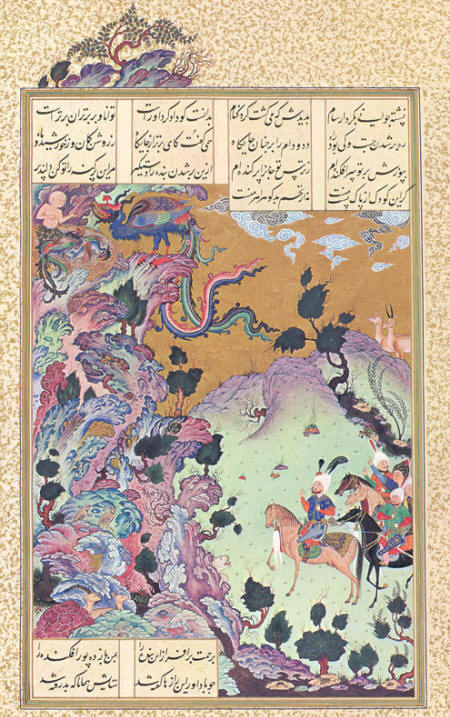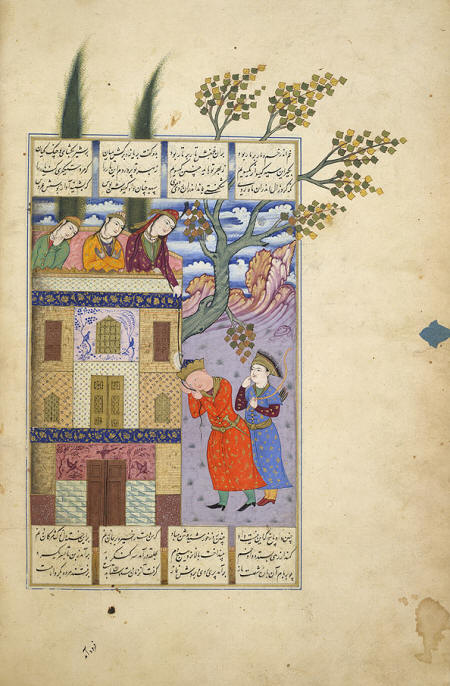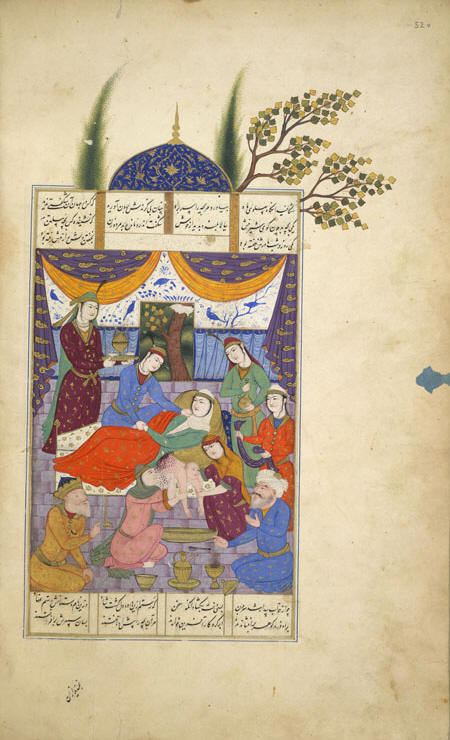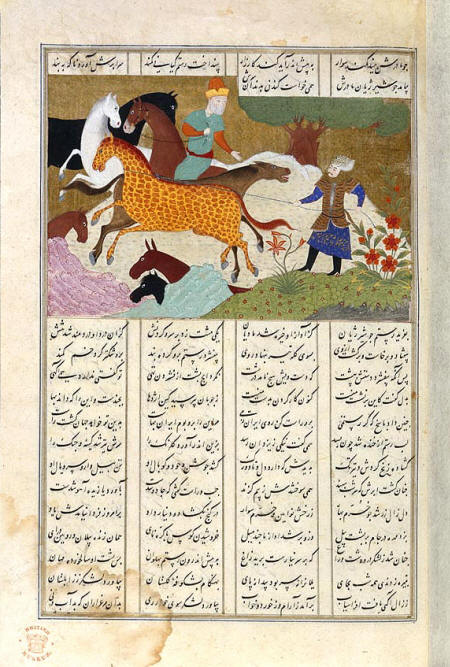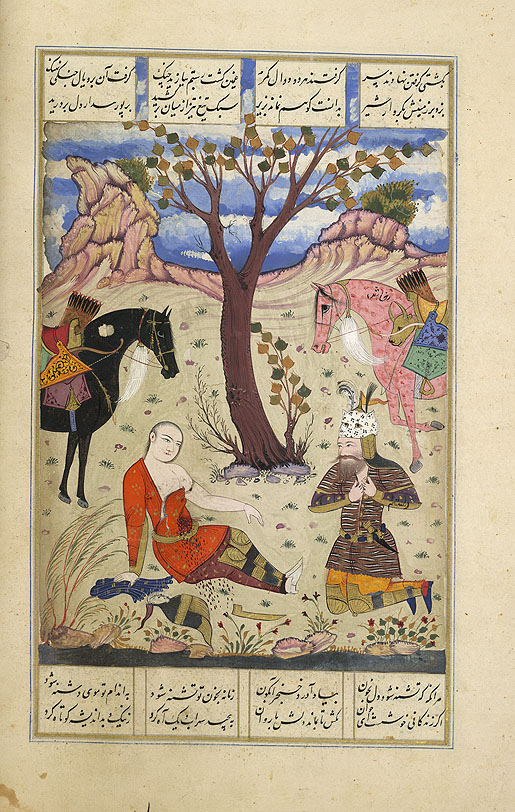
| THE HEROES - STORY IN BRIEF The Heroes - Their Story in Brief
Zal, Rustam & Sohrab
Introduction
:
The Characters :
The
stories principle characters and the relationship to one another
is as follows :
The lineage of the Siestan heroes was: Garshasp, Nariman, Sam, Zal, Rustam, Sohrab and Barzu.
The family of Sam were kings of Sistan (Sagistan) and Zabulistan, nations part of the greater Iranian federation. While their kingship was at the pleasure of the King of Kings of Iran, they nevertheless had a special role amongst all the vassal Iranian kings who formed the Iranian federation of kingdoms - they were protectors and guarantors of the Iranian throne, kings whose help was sought by the Iranian overlords during their darkest hours.
Locale - Sistan :
Sistan has other names as well, one being the Achaemenian name Zraka, then Zari, and the other Nimruz, meaning mid-day. Today, Nimruz is the Afghani province that borders Iranian Sistan-Baluchistan. The name Nimruz is thought to reflect a belief that the prime meridian of the known world stretching from Europe and Africa on the west to Japan in the east ran through Sistan. One tradition has Zarathushtra first locating the meridian and then building on observatory close to the present city of Zabol. A principal Sistan town in antiquity was At Shahr-i Sokhta and amongst its ruins an elaborate c 2500 BCE Bronze Age palace has been excavated.
Pahlavans & Their Role :
The creed of the Pahlavans is to be pure, truthful, unpretentious, good tempered and only then strong in body. Pahlavans seek to develop mind, body and spirit. They engage in learning as well as physical strength. The pursuit of both must however be preceded by modesty. "Learn modesty if you desire knowledge," goes the saying, "for a highland cannot be irrigated by a river." (Kanz ol-Haghayegh).
Today, wrestlers in Iran, Pakistan and northern India are called Pehlvans. They train with maces and clubs in Mithraeum-like (i.e. windowless Mithra temples) gymnasiums called zurkhanes. During their meditative exercises that have spiritual overtones, a musician plays a drum while reciting Shahnameh verses that recount the heroic deeds of Rustam and other champions of Iran. The epic itself sits in a place of special reverence within the zurkhane.
Zal :
Sam finds Zal in the simorgh's nest Tahmasp (Houghton) manuscript Private collection Lyons, France The images and synopsis are from or based on the pages at the British Library by Sally Pomme Clayton. The text has been updated and corrected where necessary.
Sam who had been fretting that he had no son and heir, was delighted when a son was born to his wife. His joy soon turned to fear and anger when he saw that his son, named Zal, had the hair of an old man. All reason and wisdom left Sam, who thinking his son was either an old man or a demon, ordered the baby be taken to the foothills of the bejewelled Alborz mountains and left there.
The abandoned Zal was found by the magical simorgh, an enormous phoenix like bird with red and gold feathers, who had her nest on the summit of the mountain. Carrying the baby to her nest, the simorgh took care of Zal for many years, bringing him up as her own.
Some years later, King Sam was reminded in a haunting dream of how badly he had behaved towards his son. Sam felt great remorse, and set out to the Alborz mountains to see if his son might still be alive.
The simorgh knew it was time for Zal to return to his father and Sam found his son, now a handsome young man who had been brought up well by the bird. Zal didn't want to leave, but the simorgh urged him to part. Giving Zal one of her feathers, she told him if he was ever in trouble, he must only burn the feather and she would come instantly to his aid.
Zal Woos Princess Rudabeh :
Zal travelled to meet the King of Kabul, Mirab, who paid tribute to Sam. There Zal heard fascinating tales about the beauty of Rudabeh, the Mirab's daughter. According to these tales, Rudabeh had eyelashes like raven's wings, and a face as fair as the moon. Zal was filled with longing. Rudabeh too had heard equal praise of Zal, and was intrigued by stories of his amazing strength. Finally the two were able to meet, but Rudabeh's friends teased her about falling in love with a white haired man - a man who had been brought up in a bird's nest. Zal too was apprehensive, for Rudabeh had descended of the evil King Zahak, from whose shoulders grew serpents that had to be fed with human brains.
Despite the teasing and apprehension, Zal and Rudabeh vowed to meet. Rudabeh offered to let her hair down from her tower, so that Zal could climb up and see her. Wishing not to hurt the delicate Rudabeh, Zal used a rope instead. Once united, they promised their hearts to one another alone and to love no other. Zal pledged to her, "I swear to you that this life will be unbearable for me if I cannot spend it in your presence. And I call upon Heaven to hear me that none other but you will I call my bride." Rudabeh replied, "I too swear to you this oath." Their families agreed to their marriage and an alliance according to custom and law. The ensuing wedding was joyous and lasted for thirty days.
The Birth of Rustam :
It was not long before Rudabeh grew with child. When she went into labour, Rudabeh suffered with great pain and was unable to give birth. Remembering the simorgh's magic feather, Zal cast it in the fire and no sooner had he done so that the air was filled with the flapping of great wings that covered the sun and darkened the skies. The divine bird descended before Zal who related the reason for his summons.
The bird told Zal to call for a doctor who could operate and gave instructions on how to give Rudabeh a wine that would ease her pain and make her unconscious. She continued and gave instructions on how to perform the first ever caesarean operation and how to stitch the cut from which the child would be delivered. The wondrous bird guided Zal on how he could prepare a healing drink from milk and herbs. She then plucked another feather from her plume and giving it to Zal, told him to rub the stitched cut with the feather. As she prepared to depart, the simorgh foretold the birth of a son as large a lion's cub - a son who would grow to become a hero who would become the subject of legends. With an assurance that all would go well, the bird spread its wings and soared away..
Rustam was born as the simorgh had foretold. Within five days he had grown into a boy, and within a few weeks he had grown to the height and strength of a young man. One day, while still a child, Rustam had the opportunity to demonstrate his exceptional strength. When everyone else had failed, he hunted down and killed a white elephant that was rampaging through the palace grounds.
Rustam's Horse Rakhsh :
Rustam catching Rakhsh Calligrapher: Ghiyath Al Din B. Bayazid Sarraf Sponsor unknown, Shiraz, 1486 CE. British Library Collection Rustam grew to the age when he could train as a warrior and prepare to defend Iran if need arise, it became clear to his father, that a man of Rustam's size and stature would need a very special horse to carry him and stay courageous in the midst of battle. Horses from every corner of Zabulistan and Kabulistan were gathered and paraded before Rustam. He placed his hand of might on them to see if they could bear its weight and each shuddered and bent beneath his grasp sinking to their haunches in weakness. When the flocks of Kabul were brought before him, he spotted a colt following its mother with the chest and shoulders of a lion. The keeper of the flock that he had tried to tame and saddle the horse for three years, but either the colt nor mare would permit anyone to ride the beast who they called Rakhsh, lightening.
Hearing
his Rustam swung himself upon Rakhsh's back and the mother seeing
Rustam allowed him to ride the colt who carried him like the wind
across the plains. When Rustam and the mare returned, Rustam said
of Rakhsh :
The two were to become inseparable companions, share many an adventure and roam the corners of the world together.
Rustam Meets Princess Tahmina :
Rustam and Tahmina. unknown source After a day out hunting wild ass in the wilds near Turan and the city of Samangan, Rustam feasted on his kill and fell into a deep sleep while Rakhsh grazed in the surrounding pasture.
A group of passing Turanian knights saw Rakhsh and decided to capture him. They threw ropes around the horse from all directions. While Rakhsh bit off the head of one and trampled another under his hoofs, there were too many. Rakhsh was ensnared and taken away.
Rustam awoke from his sleep to find Rakhsh missing. Distraught at losing his beloved horse, the enraged Rustam entered the city of Samangan and asked the king for assistance in finding Rakhsh.
The king of Samangan welcomed Rustam with reassurances, and invited him to spend the night in the palace before resuming his search in the morning.
In the midst of the night, Rustam heard his door open and two women approached his bedside, one a servant girl carrying a lamp scented with amber. Rustam enquired of them and their purpose and the woman replied in a fairy-like voice :
"With longing my heart is torn My life wrenched in two though I was born Sole daughter of the king of Samangan, Unveiled, I have not been seen by any man.But like a legend I have heard the story Of your heroic battles and your glory, Of how you have no fear, and face alone dragons and demons and dark unknownOf how you sneak into Turan at night And prowl the borders to provoke a fight, Of how, when warriors see your mace, they quail And feel their lion hearts within them fail.I bit my lip to hear such talk, and knew I longed to see you, to catch sight of you, To glimpse your martial chest and mighty face- And now God brings you to my father's place.
Desire me and I am yours, if not none Shall hear of me from this day on. Love has clouded thoughts of caution And sacrificed prudence for passion."God give me a son with your strength and valour, To whom shall be given these lands and empire. I will recover Rakhsh before the day is done, And place under thy feet the land of Samangan. (Verse adapted by this author)
With those words, Tahmina, the princess of Samangan, gave herself to Rustam's embrace. At the end of the next day, the king of Samangan told Rustam that his stead would shortly be delivered to the palace gates. The overjoyed Rustam, reunited with his beloved steed, returned to Zabulistan after a tearful parting with Tahmina. Nine moons later Tahmina gave birth to a son Sohrab, who grew up to be a warrior like his father Rustam.
The Tragedy of Sohrab :
Sohrab's tragic death. unknown source Rustam was unaware that he had a son, Sohrab, by Princess Tahmina as he had not seen the Princess for many years. After years without any real knowledge of one another, Rustam and Sohrab faced each other in battle, fighting on opposing sides. Rustam did not recognise his own son, although Sohrab had suspicions that Rustam may be his father.
They fought in single combat and Rustam wrestled Sohrab to the ground, stabbing him fatally. As he lay dying, Sohrab recalled how his love for his father – the mighty Rustam - had brought him there in the first place. Rustam, to his horror, realised the truth. He saw his own arm bracelet on Sohrab, which he had given to Tahmina many years before and which Tahmina had given to Sohrab before the battle, in the hope that it might protect him.
But he realised the truth too late. He had killed his own son, 'the person who was dearer to him than all others'. This is one of the most tragic episodes of the Shahnameh.
Source :
thttp://www.heritageinstitute.com/ |
